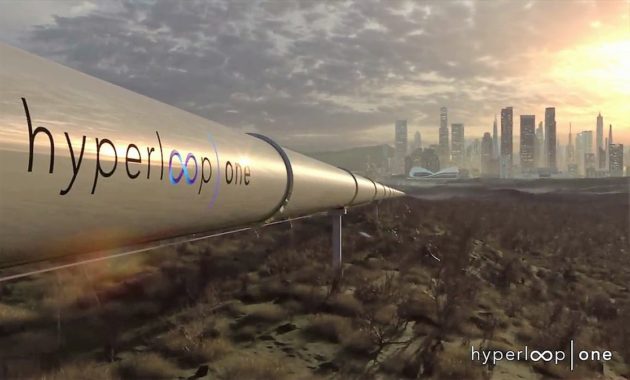
A California startup that aims to turn tech pioneer Elon Musk’s Hyperloop rapid-transit concept into reality has chosen 10 winners in a global competition – including proposed routes stretching from Chicago to Pittsburgh, Cheyenne to Denver, Dallas to Houston and Miami to Orlando.
Other winners in the Hyperloop One Global Challenge include teams from Canada and Mexico, Britain and India – but no one from the Pacific Northwest.
Teams proposing a Seattle-to-Portland passenger line and a cargo route centered on Vancouver in British Columbia were among two dozen semifinalists in the yearlong contest that didn’t make the final cut.
Hyperloop One isn’t associated with Musk, but it’s working with partners in Dubai, Russia, Finland and the ports of Los Angeles and Long Beach on projects that could result in near-supersonic, tube-based transit lines inspired by Musk’s four-year-old concept. The company already has built a prototype track in the Nevada desert.
The 10 Global Challenge winners will be added to Hyperloop One’s portfolio of potential sites. “The winning teams will get our support and resources to move their projects toward commercial readiness,” Hyperloop One CEO Rob Lloyd said in a blog posting about the contest results.
Lloyd said Hyperloop One will enter into a public-private partnership with the Colorado Department of Transportation to work on a feasibility study for the Rocky Mountain Hyperloop with support from engineering consultants at AECOM. That proposal calls for building Hyperloop links between Cheyenne, Wyo., and Pueblo, Colo., with stops at Colorado locales including Denver, Colorado Springs, Fort Collins and Vail.
Government leaders are on board with the three other U.S. winners as well. Alice Bravo, director of the Miami-Dade Department of Transportation and Public Works, heads the team for the Miami-Orlando Hyperloop project in Florida. The plan for a route that takes in Chicago and Pittsburgh as well as Columbus, Ohio, is spearheaded by the Mid-Ohio Regional Planning Commission. And AECOM’s proposal for a Texas transit network connecting Dallas, Houston, San Antonio, Austin and Laredo has the backing of city officials as well as the U.S.-Mexico Chamber of Commerce.
Hyperloop One highlighted six other routes outside U.S. borders:
- A Canadian route connecting Toronto, Ottawa and Montreal.
- A Mexican route that would go between Mexico City and Guadalajara.
- British routes for London-Birmingham-Manchester-Edinburgh and for Liverpool-Manchester-Leeds-Edinburgh-Glasgow, including a stop at Newcastle upon Tyne.
- Indian routes for Bengaluru-Chennai and Mumbai-Chennai.
Hyperloop One isn’t the only venture aiming to commercialize tube transit: Another venture, Hyperloop Transportation Technologies, is working with partners in places ranging from France to India and South Korea to advance Hyperloop projects. And Elon Musk has been talking with officials at the White House and a variety of cities about building transit tunnels, perhaps with a role set aside for Musk’s tunneling startup, the Boring Company.
Musk’s Hyperloop list includes Los Angeles and an L.A.-to-San Francisco route, a Texas route, and a line that takes in New York, Philadelphia, Baltimore and Washington, D.C.
Even though Seattle isn’t high on the list for commercial Hyperloop ventures, there’s high-level interest in high-speed regional transit:
At last week’s Cascadia Innovation Corridor Conference, officials from Washington state and British Columbia reiterated their support for ultra-high-speed transportation networks connecting Seattle, Vancouver and Portland. If transit speeds were to reach or exceed 250 mph, as proposed, travel times for Seattle-Vancouver and Seattle-Portland trips could be cut to less than an hour.
Microsoft has kicked in an extra $50,000 to supplement the $300,000 that Washington state is spending on a feasibility study. The resulting report, due to be delivered to state lawmakers by December, will focus on high-speed rail and maglev trains. “Hyperloop technology also will be reviewed, but it currently lacks complete data needed for a full comparison,” the Washington State Department of Transportation says.
Update for 11:35 p.m. PT Sept. 17: In an email, Ahmed ElAyouty, co-founder of Pacific Hyperloop, says his team plans to continue its quest:
“Hyperloop One has narrowed down to the regions most energized to embrace Hyperloop tech. Although Pacific Hyperloop’s proposal did not make this first round, WSDOT recently released an update to the ultra-high speed transportation study, explicitly calling out Hyperloop technology as a definite alternative to connect Portland, Seattle and Vancouver, B.C.
“In all scenarios evaluated for the Pacific Northwest region, Hyperloop will improve quality of life and speed up our economy. At Pacific Hyperloop, we are in the process of bringing together innovative partners to build out a local Hyperloop route, and you can expect an announcement in the coming months.”



